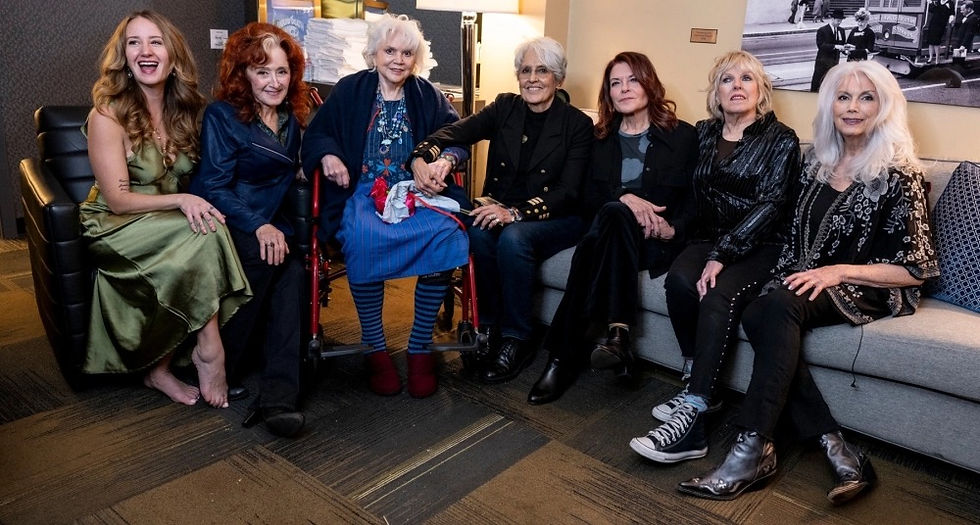Van the Man Back at What he Does Best
- cutlercomms
- Mar 22, 2023
- 4 min read

Van Morrison has stepped down from his righteous political platform and headed back to where he best belongs – the nonpartisan purity of an old-fashioned recording studio which produces good in-your-face music. In this particular case – skiffle.
For Van-the-Man has just released Moving On Skiffle, a reverting collection of covers from the delightful – if somewhat short-lived - skiffle craze of the late 1950’s. There is something here for all lovers of Americana music whatever the influence – blues, country, gospel and folk – from the artist honoured with a Lifetime Achievement Award by the Americana Music Association in 2017
Morrison’s 43rd studio album - in a recording career spanning more than 60 years - comes after what became known as his COVID albums – Latest Record Project Volume One (2021) and What’s It Gonna Take (2022). Not only were these recorded during the global pandemic but reflected his anti-vaccination views and his rage at Government-enforced lockdowns. Songs titled “Why Are You on Facebook?” “Stop Bitching, Do Something” and “They Own the Media” said it all.
“The new normal is not normal,“ he sang. “We were born to be free.” He even took his crusade outside the studio by issuing legal proceedings against the Northern Ireland Minister of Health Robin Swann who had described Morrison’s songs as a “smear” on those involved in the public health response to the virus.
But he appears to have moved on from his conspiracy-theorist days with the release of the delightful Moving On Skiffle.
The only hint of the pandemic controversy comes halfway through the 23 easy-listening, singalong tracks with a somewhat tongue-in-check, self-deprecating version of “Mama Don’t Allow (No Skiffle Playing Round Here),” a song from the 1920’s. Morrison re-titles it “Gov Don”t Allow” and kicks it off with Gov don’t allow no skiffle playing in here before adding Gov don’t allow no freedom of speech in here. And just before anyone thought he was really serious, he adds the absurd: Gov don’t allow no washboard playing in here.
There is nothing really malicious about the song. It is a bubbly number which sits well in the middle of some of the most innovative and inventive covers you may ever wish to tap a foot to!
It is no surprise that the Carter Family standard “Worried Man Blues” gets the skiffle treatment from Morrison. For indeed the song was a staple back in the 1950’s for Lonnie Donegan, the man they called the King of Skiffle. In fact, Donegan was part of Van’s previous foray into skiffle music, The Skiffle Sessions – Live in Belfast, which he recorded in 1998, with Donegan and jazz legend Chris Barber. It was released in 2000.
Surprisingly, the only song Morrison revives somewhat from that album is indeed “Worried Man Blues” – it got the “It Takes a Worried Man” treatment back on the 2000 version. But he does two songs that clearly reference his now-departed co-stars. The Woody Guthrie-penned “Gypsy Davy” was a regular on the Chris Barber Skiffle Group’s setlist, while “Travelin’ Blues” was among the old southern songs Donegan included in his vast catalogue.
There is also only one band member from the 1998 Belfast recording. Famed percussionist Alan “Sticky” Wicket - a long-time collaborator with Morrison - returns to provide a genuine skiffle break on washboard. The presence of “Sticky” throughout the album is essential because the real challenge for Van is how to convert these songs from various genres into skiffle.
This is especially so in the case of the two popular country weepies from Hank Williams. Can he give these the skiffle rumba. The short answer is no. But he sure makes them his own. He has simply wonderful backing vocals on a majestic version of “I’m So Lonesome I Could Cry” and then demonstrates his own vocal extremities – and saxophone prowess - on “Cold Cold Heart.”
The vocal harmonies from a trio of female singers also work a treat on a fully-funky version of the Hank Snow favourite “I’m Moving Own,” as does the quirky backing adornment he receives on another country block-buster, Don Gibson’s “Oh Lonesome Me.”
Morrison may not have the tenor vocal range he had in his hay day – listen to the majestic “Ballerina” off his acclaimed 1968 album “Astral Weeks” – but he still ain’t bad at the age of 77. His voice – nicely serenaded by Seth Lakeman’s fiddle – is especially soothing, even mournful, on the wonderful closing track, Dave Van Ronk’s “Green Rocky Road.” Contrast this with the vocal grunt he delivers on “Yonder Comes A Sucker.”
Overall, Moving On Skiffle is seething sophistication. Every piece of this production fits so perfectly – whether it be Morrison’s harmonica riffs at just the right time on “No Other Baby” or Richard Dunn’s jaunty organ on the opener, Elizabeth Cotton’s “Freight Train.” It probably helps that most of the band were also backing Van on the last two above-mentioned albums. They surely know how to follow his seat-of-the-pants recording techniques.
But, in the end, there would be no Van without the Man himself. It is good to have him back at his inventive best - where only music matters!
Paul Cutler
Editor Crossroads – Americana Music Appreciation





Comments